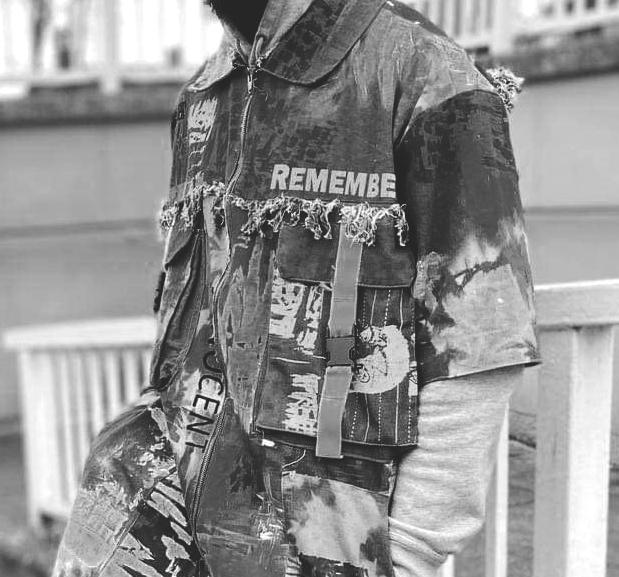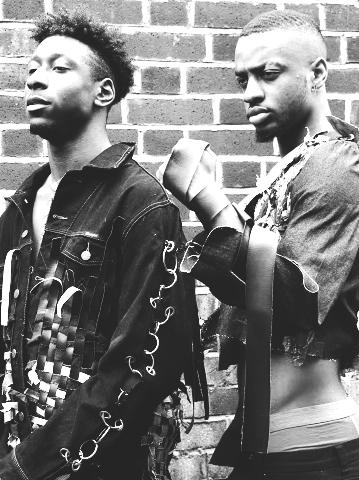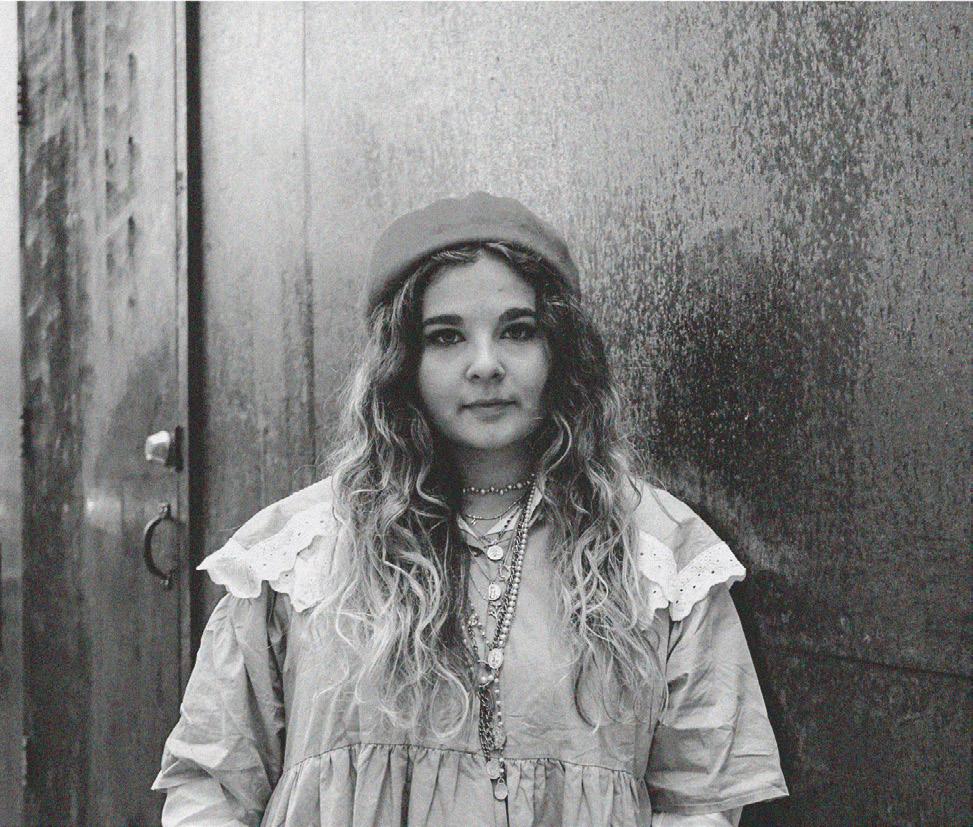
11 minute read
FASHION: FASHION MEETS ACTIVISM
Words - Alice Stevens Photography - Tamar Levy Design - Lauren Bourne
FASHION STUDENT TAMAR LEVY ON HER ARTISTIC INFLUENCES, INGORANCE AND ALLY-SHIP OUTSIDE OF SOCIAL MEDIA
Advertisement

As spring dawns on her final year studying fashion design, Tamar Levy has never been busier in her entire life. Specializing in menswear at the Manchester School of Art, Tamar has recently been shortlisted for the prestigious Hempel Award – the 29th China International Young Fashion Designers Contest and selected to showcase her work at Beijing Fashion Week, all while creating her final collection at university.
“When I was younger and struggling to read and write, I’d always get complimented on my artwork. Even after I was diagnosed with dyslexia and improved in all my other subjects, art was the one thing that I really wanted to pursue, because I found comfort in drawing and painting,” says Tamar.
“I’m interested in the relationship we have with clothing and why we choose to wear what we do. I want to comment on what black people are having to do in this country to feel accepted.”
Tamar frequently discusses racism within her work, drawing on her own experiences and that of her friends and family to highlight the systemic problems within society, such as police brutality and the lack of awareness surrounding key anti-racism movements.
“Every black man I know has either been assaulted, wrongfully stopped and searched, or has experienced some form of racism based on the way that they look. If you’re a white man, you can probably walk down the street with your hood up, whereas it’s not the same for a black man. My work asks the questions: What should a black man wear? What can a black man wear?”
Originally planning to pursue costume design, Tamar enrolled on a foundation degree at Leeds College of Art in 2017, where she began scrutinizing Britain’s longstanding systemic racism through textilebased artwork. She sourced her inspiration from the Black Panther movement of the 1960s and Beyonce’s 2016 Superbowl performance, although her projects often lacked interest or acknowledgement from her predominantly non-black classmates.
“After seeing Beyoncé perform, I was in awe. She was wearing a tight leotard with her hair really big and curly, and she was proud of it. There was a togetherness between these women; the outfits were so flattering to their bodies, not only showing their beauty but also their strength after being so oppressed.
“It made me feel really empowered and I wanted to reflect on that feeling. I wanted to make a statement about how my own clothing is used to protect me, like how all of my coats have to have hoods so that my hair doesn’t frizz, because then it’ll be straighter and I’ll fit in more. Or, that I always wear shoes that haven’t got too big of a sole because I don’t want to be any taller than I already am. or knew about the movements,” she adds. “There were only three or four people of colour on the whole course, so I immediately felt out of my depth.”
During her first year at university, Tamar continued to draw attention to social issues through the creation of her ‘Not a Native’ campaign, which aimed to raise awareness of the 2017 Windrush Scandal.
Between 1948 and 1973, nearly half a million people came to the UK from the Caribbean on the HMT Empire Windrush to work as nurses or labourers in Post-War Britain. However, 70 years later, a government policy of Theresa May’s cabinet resulted in the wrongful detainment and deportation of commonwealth citizens.
“This campaign focused on how the country is trying to remove people’s sense of belonging. It was that realisation that if it could happen to my dad or to my auntie - it could happen to me. They could take everything away.”
Tamar has also worked on projects inspired by the Central Park Five and Colin Capernick’s Nike campaign after he took the knee. The former was a narrative project on Korey Wise, who in 1989 - a then 16-year-old boy - was wrongfully convicted of the assault and rape of a female jogger in Central Park, after being coerced into false confessions alongside innocent teenagers Yusef Salaam, Kevin Richardson, Antron McCray and Raymond Santana.
“I made a jumpsuit that I pictured Korey Wise might have worn when he was in prison. It’s got graffiti all over it because I imagined that he would write on his clothing as he had no other means to express himself.”


However, after working tirelessly to produce garments which shed light on the UK’s deep-rooted racism, Tamar now feels slightly restricted as a designer. “When I’ve done various projects before, people haven’t known about the issues behind them, but now people expect me to stick to that - they just see me as the girl who does protest work,” Tamar explains. In reality, Tamar aspires to create work in a world where racism isn’t an issue.
Her exasperation continues online, as she expresses frustration at the wave of performative allyship which bred across social media following the Black Lives Matter protests last summer.
“Although I’m really happy that the movement is getting the attention it needs and so desperately deserves, I’ve just experienced racism for so long that there’s always been a conversation about it.
“It’s sad that we had to repost a video of George Floyd being murdered for people to care about this problem. I know some black and mixed-race men that have experienced really violent stop and searches who are suffering from PTSD, so to keep seeing that video only brings back the horrible things that happened to them.”
Tamar adds: “It’s important to post content, but it’s also important to check in on people in your community and see what you can actually do for them. That small act of kindness makes a big difference, because you’re acknowledging there is a problem.”
International Students Prove x TenaciousISOLATION x OPTIMISTIC and (Mostly) OptimisticSTUDENT x x DuringLOCKDOWN Lockdowns, Isolation and x ONLINE LEARNING Online Learning
Meera Jacob answered our Microsoft Teams call from her hometown in Kerala, India. The gravel path obscured her voice at times as she walked down an empty alleyway, explaining her experience of being an international student, stuck in her home country, yet still doggedly pursuing her studies in the UK.
Meera, a postgraduate student studying creative writing at Manchester Metropolitan University, is one of many students who started the 2020/21 academic year with high hopes that her course would find some sort of normalcy despite the ongoing pandemic. Unfortunately, as the weather grew colder, and restrictions tightened in parts of the UK, that was not the case.
Soon after the 20/21 academic year began, courses were once again shifted online, and shortly after the holidays, a new national lockdown was announced, leaving many international students stranded in their home countries.
According to the Higher Education Statistics Agency, the 2019/20 academic year saw over 127,000 international students studying on a distance learning course through universities in the UK. This data does not reflect those students, like Meera, who began their studies in the UK, yet found themselves unexpectedly studying from their home country as the pandemic caused flight delays, new waves of lockdowns, and tighter restrictions across the globe

Luckily, by the time Meera had flown back to India for the holidays, she had completed her taught modules and was focusing on the independent study aspect of her course. “My classes would have been difficult to attend while in India. They start at 6pm and finish at 8pm, which in India would be midnight until 2am,” said Meera.
Despite early concerns that the pandemic would lower international student enrolment rates, statistics show that numbers had gone up by the end of 2020, especially among non-EU international students. UCAS data shows that by September of 2020, non-EU international students accepted into higher education in the UK rose significantly from previous years, from 40,720 in 2019 to 44,300 in 2020.
Pictured: Meera (Above)
x
Many students applied to their courses before the pandemic became a global issue. Lili Grosserova, a third year English student at Manchester Met, didn’t feel that deferral of her studies was a realistic option because she was so close to completing her course.
Despite the shift to online learning and opportunity to return home and continue her studies from the Czech Republic, Lili chose to remain in Manchester. Lili explained: “I stayed in Manchester with the hope that in-person classes would return and the second block of teaching would be better, but everything is more stressful. If I were home, I wouldn’t have to worry about paying rent or buying food.”
Lili, like many international students, has struggled financially throughout the 19/20 and 20/21 academic year. Under normal circumstances, students would easily be able to secure part or full time employment to help support themselves financially, but, in the current situation, job opportunities have been severely limited. In turn, this affects some international students’ ability to secure financial assistance from the UK government. Unlike many domestic students though, international students cannot easily return home or rely on their families for assistance.
“I needed to be working to get a maintenance loan, but this was hard as there were no jobs,” said Lili.
A lack of jobs and a lack of opportunities for work experience has many upcoming graduates concerned. According to a survey conducted by Prospects, 64% of final year students felt discouraged by job prospects following graduation, with over 83% of final year students having either lost current employment or internships or having had offers for positions rescinded during the pandemic. This becomes doubly worrisome for international students, who have to consider their visa status, funds to support their stay until they find work, family expectations and relationships.
Universities, for their part, are doing their best to accommodate the additional need for financial assistance. New programs, like the Student Hardship Fund at Manchester Met, offer international and domestic students alike much needed financial support during the pandemic. However, the Manchester Metropolitan website clearly states these funds are limited.
Another major issue the international student community faces, especially those from non English speaking countries, is the lack of peer-to-peer interaction needed for language acquisition and basic assimilation into university life.

x
LEARNING
LOCKDOWN
In addition to financial support, universities are offering extra programs for socialisation and mental wellbeing, which are aimed at better integrating international students into university life. Manchester Met has been hosting online drop in sessions, offering students a chance to engage and socialise in an informal setting. Though staff responsible for overseeing and supporting the international community understand that this alone does not alleviate the frustrations these students face.
Richard Silburn, Director of the Language Centre and International Lead for the Department of Languages, Information and Communications, says he worries “that international students are missing out on that casual interaction, as a result of online classes”. He added: “There is a recognition that things are not what they were, so we [the university] are trying to compensate for that.”
The university is working to provide more opportunities and support for international students. “We have a course called Conversation Club, where students are able to practice every day English, and the Faculty try to build in a level of informality before each online class to help make up for the socialisation international students are lacking,” said Silburn.
Nina Schaarschmidt, a German student studying fashion and promotion, said: “Zoom and Teams can’t replace in-person conversation. What I really struggle with is not seeing my friends.” Like Meera, Nina is also currently studying from her home country after returning to Germany for the holidays. Enrolled on a practical based course, she found the reduced access to university equipment and resources due to government restrictions to be doubly challenging.
“I think there are international and practical students who are suffering a lot more. Design students, like me, are deprived access to industrial sewing machines and other vital equipment,” Nina added.
Despite all of the difficulties they are facing, international students still remain optimistic, focusing on the positives that have come out of the current situation.
Nina said: “Learning remotely has encouraged students to be more innovative and creative. We have had to become more self-motivated in regard to work.”
Richard Silburn echoed this sentiment by suggesting although students “may not be developing their informal communicative competency in the same way, their digital literacy is becoming stronger” as a result of online interaction.
Meera, too, has found positives amid the challenges. She said: “This year has given me more time to think and regroup, allowing me to discover what I’m best at, academically and creatively.”

Pictured: Lili (Left) Nina (Above)










